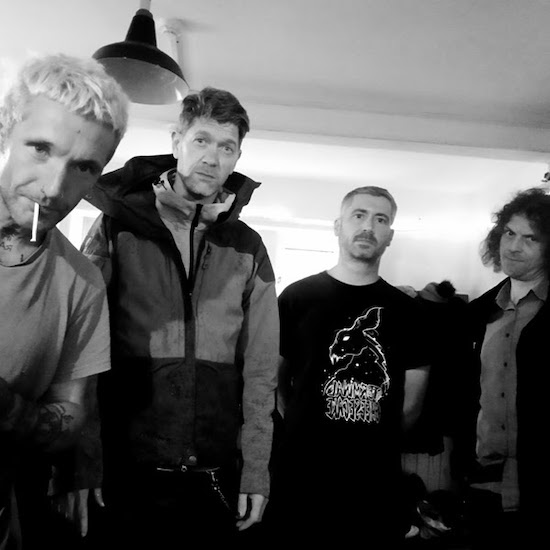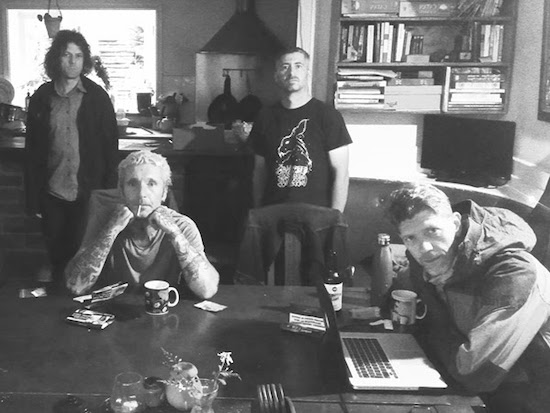Gnod is good. Still.
Tumbling into any given Gnod release always requires the unravelling of one’s own psychic threads as much as trying to fathom what the band have achieved sonically. While your first reaction will likely be visceral – joy, confusion, panic, frustration, abject revulsion – there’s nevertheless a deeper temptation: to scratch, sniff, pick and rummage through it all in order to get to the root of why it’s making you feel the way that it does.
And so it rightly is with Hexen Valley, an album that’s typically contrary, goading like someone rhythmically kicking your seat on the world’s slowest Megabus journey while also possessing a delicious, slobber-inducing immediacy that feels unfathomably right despite all its inherent wrongness. Comparing Gnod with Gnod seems like an exercise in futility since the only difference is that things are utterly different while being, in broad-brush vibe-wise terms, not that different at all. Since markers are always helpful and since the terrain is, shall we say, uncertain, let’s just say that things are sparer than last year’s La Mort Du Sens while at the same time heftier and more muscular. And if it’s not as frantic or untethered as Just Say No To The Psycho Right Wing Capitalist Fascist Industrial Death Machine, the aggression is still there – just rendered more abstract, more abstruse.
Opening with the wobbly clank ‘n’ slur of ‘Bad Apple’ gives you fair warning as to the scrapes, twangs and twinges that lay ahead, before things open into the huge, sick-making bassline of ‘Spotlight’ – the sound of something enormous burrowing deep beneath the soil that causes even the sturdiest aboveground structure to violently rend and buckle. The wet thud of Chris Haslam’s bass plays a similarly pivotal role in ‘Antidepressants’, its bloop and blart skulking in the shadows while frontman Paddy Shine wails disconsolately and the atonal plink of a dead guitar string ticks away with monstrous regularity before things finally yaw into a screeching white noise overload. The pace picks up momentarily for the aptly-titled ‘Still Runnin’’, but rather than graceful, gazelle-like strides, it’s more like a headlong flight through a nightmare – a lolloping, tar-shod gait that never seems quite fast enough to outrun one’s shadowy pursuer. The album closes with a rendition of ‘Waves Of Fear’. This sees the band taking Lou Reed’s paean to panic and self-loathing and twisting it til the top threatens to pop right off, simultaneously channelling Mark E. Smith, Pere Ubu, and Harvey Milk.
That such chaos and confusion can sound so cleverly marshalled and so entire is testament to the band’s skill, vision and tenure (they celebrate their super sweet sixteen this year), but it’s also fair to say that the band’s communal living arrangements also play a large part in their ability to sing from the same sheet of blotter acid. Conceived and recorded while residing in a housing co-op in Hebden Bridge, the latest incarnation of the band cohabit like a sort of psych-noise-stoner-punk Bert and Ernie. This has obvious benefits in terms of creativity, coherence and exploration for the band, but also for us listeners. Beyond the music itself, the set-up suggests certain myth-rich possibilities, bringing to mind Ken Kesey’s Merry Pranksters, the warren-like community of Rhode Island’s defunct Fort Thunder, and the chucklesome rumour that Fugazi chose to live an austere, self-flagellating shared-house life that saw them forgo such basics as heat.
A sense of community has been a perennially important part of Gnod’s odd genetic make-up, and this has always extended beyond the band itself. It’s wound in the spaces they’ve inhabited, their fluctuating all-doors-open approach to line-up and a willingness to collaborate with artists from disciplines other than their own. Hexen Valley sees this sense of community playing out on a more parochial level: odd snippets of Hebden Bridge life, from fragments of pub conversation to ads thumbtacked onto shop noticeboards, seemingly giving credence to the old saw that it takes a village to raise a (mutant) child.

Conversely, it’s also an album that puts the band at the heart of a far wider community, tangling them in amongst a twisted maze of roots, creepers and overhanging branches that connects them to a rich tradition of very British psychedelia. It’s a heritage that casts back to the heavy, angsty invocations of Loop, Spacemen 3 and World Domination Enterprises and bleeds into the combined weirdness of labels like Rocket Recordings, Wrong Speed, God Unknown and Cardinal Fuzz. Bands like Big Naturals, The Heads and Thee Alcoholics serve as semi-reliable touchstones, all of them having peddled a brand of rancid, bad-vibes psych that seems very much the product of a troubled country riven with bitterness, division and uncertainty.
If the contradictions here seem embolism-inducing then that’s okay, because Gnod have somehow gotten it all under control. One of their subtler masteries is being able to balance the deep inward-focus afforded by being in each others’ pockets with the ability to digest and reprocess the psychic shit of a nation that is very ill indeed.
While this is admittedly a lot to have sloshing around in the bucket, it ultimately leaves us in an extremely enviable place. The slurping riffs, pit-of-the-stomach grooves and brutish invention are immensely satisfying, and in simple terms Hexen Valley represents the latest exciting stage of development for one of the UK’s most vital bands. But there is more – always more – in terms of thought, in terms of promise and in terms of how it integrates with all the other thrillingly bizarre music that has been and is being made. It all just depends on how far you are willing to dig.



